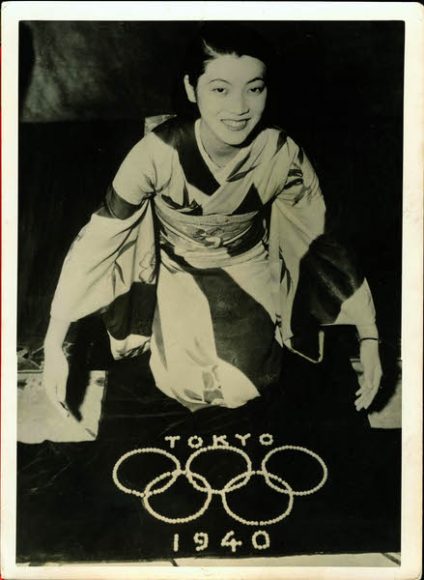One of the most dramatic stories to take place as a result of the Covid-19 pandemic was the postponement of the 2020 Summer Olympics in Tokyo until next year. This marked the first time that the quadrennial event was forced to be rescheduled.
Yet this is not the first time that Tokyo had problems being able to host the Olympics. Eighty years ago, the world’s greatest athletes were supposed to arrive in the Japanese capital for the competition — but those games never took place.
The weird history of the 1940 Olympics began with Japan’s 1931 invasion of Manchuria and its establishment of the puppet state Manchukuo in 1932. Alexis Dudden, professor of history at the University of Connecticut and author of the forthcoming book “The Opening and Closing of Japan, 1850-2020,” noted the United States attempted to lead international criticism against Japan, even though its absence from the League of Nations limited its efforts. The Japanese government believed its creation of Manchukuo fell within “the rules of the road for European and American states at the time” and bristled when the League of Nations criticized it.
“So, Japan walked out of the league,” she added.
Dudden observed that Japan’s militarist leaders were not losing sleep about being viewed as a pariah by the League of Nations, noting they were “far more ultra-nationalist and speaking in very racialized terms that Japan would lead Asian nations against white supremacy and white imperialism.” But despite these circumstances, the International Olympic Committee (IOC) oddly decided in 1936 to allow Tokyo to host the 1940 Summer Olympics, with the Japanese city of Sapporo receiving the Winter Olympics for that year.
According to Dennis Frost, chairman of the history department and director of East Asian Studies at Michigan’s Kalamazoo College, putting the Olympics in Japan was a truly baffling decision.
“By that point, Japan was actively engaged in war,” he said. “It had been in military conflict since the early 1930s that escalated to full-scale military conflict with China around 1937. It was at that point that mobilization was starting to escalate in Japan, and the costs of the war were becoming more and more apparent to people until they were cutting costs everyplace.”
The world community was also alarmed by what was happening, and Frost pointed out there had been “lots of talk internationally about the possibility of boycotts and protests against the Japanese actions in China.” While several European countries favored a boycott, Avery Brundage, the president of the U.S. Olympic Committee, was vociferously opposed. Brundage had also infamously defended Nazi Germany against a boycott of the 1936 Berlin Games.
Nick Kapur, assistant professor of history at Rutgers University, recalled the Japanese themselves solved the crisis by withdrawing as the Olympic host in July 1938, two years before the games were to begin.
“I think the word they used is ‘returned’ the Olympics to the IOC,” he said. “I don’t think they gave a very clear reason, but the real reason was that the war was so exacting. It was really crazy of Japan to try to invade a huge country like China. They bit off way more than they could chew. The war in China was bogging down and becoming hugely expensive, so they felt they just didn’t have the monetary resources to pull off the Olympics. They had no money to spare.”
The IOC quickly awarded the Summer Olympics to Helsinki, the runner-up in the bidding for the events, while the Winter Games in Sapporo were first given to Switzerland’s St. Moritz. But a dispute with the IOC led to that event being granted to Garmisch-Partenkirchen, the German resort that held the event in 1936. Sadly, it all came to naught: The launch of World War II resulted in no Olympics for either 1940 or 1944, with the eventual resumption of the events in 1948 with the Winter Games in St. Moritz and the Summer Games in London.
Tokyo would host the Olympics in 1964, with Frost defining the moment as a “very successful event that transformed the international image of Japan. It was kind of like a postwar coming out party showing Japan was peaceful and technologically advanced.” (Sapporo received its second chance for the Winter Olympics in 1972.)
Today, however, lingering concerns about the medical safety of the Olympics continue to percolate. Japan’s former Olympic minister Toshikai Endo stated that a final decision needs to be made by next March on whether the games will be able to proceed. There has also been talk within the Japanese government about a reduced Olympics with limited or no spectator seating in the venues.
On the financial side, the games have become an Olympic-sized money pit. The original budget for the Olympics when Tokyo secured the event in 2013 was $7.3 billion, but that ballooned to $12.6 billion before the postponement. The delay has reportedly cost Japan between $2 billion and $6 billion.
“The postponement came quite late, so it’s obvious that a number of leading Japanese politicians and sports officials were not at all happy with the idea of not hosting the Olympics as intended,” said Stefan Huebner, author of “Pan-Asian Sports and the Emergence of Modern Asia, 1913-1974.”
Huebner added another global event, the EXPO 2020 in Dubai, was also postponed until next year, and he pondered that “cancellations of such mega-events are the very last resort and would not happen without significant public pressure. The pandemic nevertheless could play into the hands of those Japanese who, like many people in Western countries, oppose hosting the Olympics. For them, the event is a big waste of money, constitutes a serious traffic nuisance and also has a negative impact on the environment.”
Yet Joshua Shuart, director of the sports management program at Sacred Heart University, believes the Japanese and the world will be eager for the games to go on, even in a downsized format.
“I think people at this point are starving for sports,” he said. “I think if it goes off, it’ll be a positive that can be turned into huge global moment with everyone getting together to have a sports party.”






